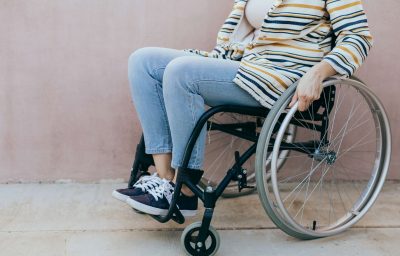
Women with disabilities are nearly twice as likely to experience life-threatening pregnancy complications or maternal death compared to their peers, a study by University of Toronto researchers has found.
The study, published in the journal JAMA Network Open, is the result of the largest study of maternal outcomes for women with disabilities in Canadian history, highlighting the need for better access to medical care in this population of women.
“We need to make health care more accessible, but this also raises awareness that women with disabilities have a right to quality health care and good pregnancy outcomes,” says lead author Hilary Brown, an assistant professor in the department of health and society at U of T Scarborough and an adjunct scientist at Women’s College Research Institute and Institute for Clinical Evaluative Sciences (ICES).
While life-threatening pregnancy complications and maternal death are relatively rare, Brown says both are on the rise in North America – and that the effect on families is devastating. She notes that pregnancy rates among women with disabilities have also been rising over the past 20 years, and that women with disabilities now account for nearly one in eight births.
“At the same time, health-care guidelines in Canada on how to best provide pregnancy-related care to these women has not improved,” says Brown, who is cross-appointed to the Dalla Lana School of Public Health and Temerty Faculty of Medicine. “Women with disabilities are more likely than their peers to experience social and medical risk factors, but until now rates of life-threatening pregnancy complications or maternal death among this group have been relatively unknown.”
The U of T study looked at Ontario health record data from 222,000 women with physical, sensory and intellectual or developmental disabilities, as well as 1.6 million women without disabilities, who gave birth between 2003-2018. Brown and her colleagues found that life-threatening pregnancy complications or maternal death happened at a higher rate for women with disabilities. Women with multiple disabilities were also at double the risk (3.4 per cent) for negative pregnancy outcomes compared to women without disabilities (1.7 per cent).
They also found there were 14 maternal deaths per 100,000 births among women with disabilities compared to just eight deaths per 100,000 births among women without disabilities.
Brown says social factors faced by women with disabilities – including barriers to employment, education, stable housing and access to health care – as well as medical factors such as a higher incidence of chronic disease can result in negative pregnancy outcomes. But even after accounting for these factors, she says there were still disparities between pregnancy outcomes for women with and without disabilities.
“Pregnancy guidelines specific to the needs of Canadian women with disabilities do not currently exist, and there are few obstetric programs created with the needs of women with disabilities in mind,” says Brown, who is an expert on reproductive, maternal and child health.
She points to a lack of pre-conception programs tailored to meet the needs of women with disabilities and inadequate or non-existent disability-related training for obstetrical health-care providers as examples.








